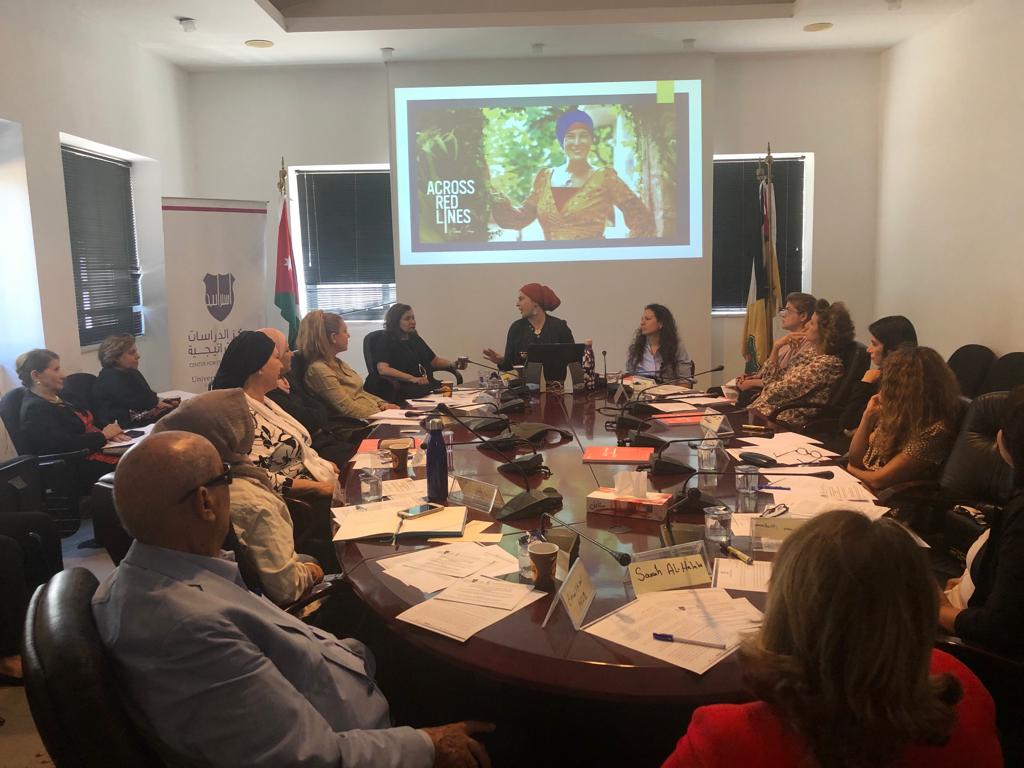As part of Al Nahda Thought Center regular sessions with experts, activists and thought leaders, and in partnership with the Center for Strategic Studies at the University of Jordan (CSS), the Arab Renaissance for Democracy and Development (ARDD) held a Seminar entitled “The Key to Change: Learning from Women’s Initiatives in the Arab World” by two international social work experts and activists; Dr. Dina Khawaja and Ms. Manal Omar.
The seminar, held on Tuesday 8 October 2019 at the Center for Strategic Studies, was attended by several activists, civil society, women’s programs and initiatives’ representatives and leaders in Jordan. The first session entitled “Activism and Diversity of Civic Struggles” was presented by political science researcher and Asfari Institute director, Dr. Dina Khawaga.
Khawaga confirmed that such seminars present an opportunity to compare notes and foster collaboration; she also added that “Women’s movements,” and going beyond just “gender studies” takes place when the personal is transcended, and personal struggles are channeled towards structural change. Which include: Moving from personal forms/experiences of oppression to overarching women’s rights issues, establishing a voice for the region from the region – and in the native language especially for MENA, and moving away from identity politics that reduce the region to “oppressed victims” of Arab culture or Islam.
She also affirmed that much progress was achieved by the Feminist movement in the region, and emphasized the importance for prioritizing the social movement mentioning the challenges that it face moving forward which includes lack of public space for women to pursue and develop the women’s movement; the general social outlook is that women are “weak” or need to be “empowered”, specific strands of feminism (such as “state feminism” or “leftist feminism”) tend to dominate the discourse, tone-deaf policy/advocacy which represents a setback and the difficulty achieving proper balance between engaging versus alienating the non-secular in pursuing social change.
Concerning women’s movement and women affected by conflict, Khawaga added that There is not enough attention/emphasis on the nuclear family and the ways that it is affected by forced migration, or conflict in general in addition to the lack of adequate institutionalized protection mechanisms for women affected by conflict, with the exception of women’s and human rights organizations. She also added that the only accurate depiction of the effects of conflict on women and their families is produced by women.
Dr. Khawaga called on researchers to change perceptions of women and their roles (including the way that non-paid work is valued) and on the civic society to focus on breaking the cycle of unwritten rules that leave women vulnerable
The second session “The Transformative Power of Women” was presented by the founder of Across Red Lines, activist Manal Omar. Omar emphasized on the importance of context and localization in social work, she added that people often don’t agree with macro-level assertions about their realities and that women recognize the intricacies of their context/family/social landscape best. However according to Omar ways women are unprotected, while men have more of both physical security and the protection of their ‘tribe’ or social group. Women are most protected when they build communities.
Omar emphasized the importance build bridges between academics, practitioners, and decision-makers; adding that currently secular and Western ideas dominate feminist discourse; and that research shows that when a society invests in women, it develops; she also argued on how civil society could work towards sustainable change through effective collaboration.
The sessions were followed by an open discussion with the participants, (The Jordanian National Commission for Women CEO, Dr. Salma Nims pointed out that Jordanian feminist/women’s rights activists often face unrelenting, multi-dimensional criticism; adding that Certain voices that are associated with elite institutions have a significant influence on discourse and have the power to control the narrative; and calling on women’s movement to establish clout and invest in knowledge production.
Women’s Studies Centre CEO Dr. Maysoon Otoum questioned what women can do to establish and protect their voices since men control the political discourse. SIGI Jordan’s representative Ms. Huda Zoubi also added that in terms of relating to the non-secular, the problem is not religious texts, but how they are interpreted. Commitments should be made to developing local, feminist capacities to re-interpret texts from a feminist lens and that It’s important to highlight the good as much as we critique the bad.
Activist Oroub Soubh stated that it was crucial to consider how the political and the economic are in conversation and added that movements alone can’t be the solution we seek, instead, academia must become more radical and civil society must strengthen values rather than operating like businesses.
American University of Madaba Professor and Researched Dr. Wafa abu Khadra stressed the importance of discourse, and finding ways to foster it is a priority; she also called For Jordan, there needs to be identification of women’s movement positioning and definition of a spectrum that considers all forms of input; and argued how to use terminology to reclaim the discourse. She also highlighted the importance of combating patriarchal political discourse and self-critical analysis of the feminist movement to ensure ownership of their discourse and narratives without prejudice
The Seminar concluded with several recommendations and remarks such as: the importance of refraining from making people choose an identity, because moral authority is derived from different places for different people. In addition to carefully choosing the battles to fight with consideration to seeking authenticity rather than acceptance. And finally, in reference to MENA, while it is true that the region has conflict within it, it also incorporates many other things and these multi-dimensional realities are all expressions of the region.


